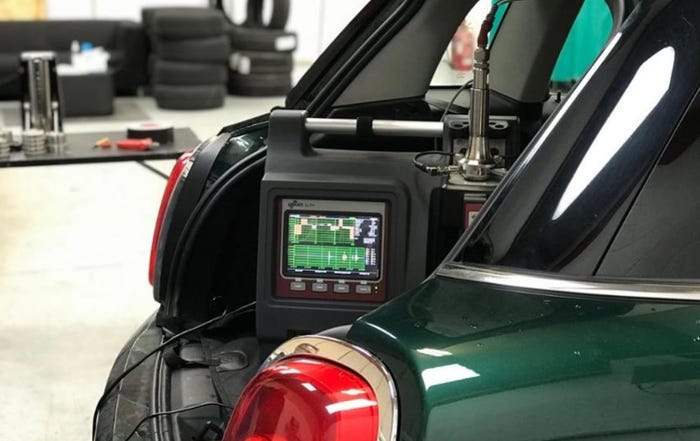Alpina Juices Up BMW 7-Series to Create Powerful B7
A German company converts a top-of-the-line fullsize luxury sedan into a sporty performer.

MONTEREY, CA – For many luxury car buyers, the BMW 7-Series is as good as it gets for a fullsize sedan with rich amenities, high-tech gadgetry, smooth driving dynamics and a twin-turbo V-8.
“The 7-Series delivers a lot,” including power, Ludwig Willisch, president and CEO of BMW of North America, tells WardsAuto. “For many people, a car with 445 hp is enough.”
But for those who want their 7-Series sleeker and faster, there’s the ’13 BMW Alpina B7. It is a high-performance luxury sedan created by a vehicle modifier at its plant in Buchloe, Germany, near BMW’s Munich headquarters.
“Alpina has always been its own company,” Willisch says of the firm that holds an exclusive, technology-swapping agreement with BMW. “They take the liberty to do a design on the 7-Series that is sportier, and not something we would do on our line.”
That includes juicing up the engine and adding extras such as a rear spoiler and lower rear panel with four integrated tailpipes.
The aerodynamic-enhancing spoiler and lower rear valance on the hand-finished exterior reduce drag and lift, lower wind resistance and offer better stability at high speeds, says Andreas Bovensiepen, head of Alpina, a firm founded by his father in 1965.
Alpina-version BMWs have been sold in the U.S. since 2003, starting with the Z8 roadster. The second-generation ’13 B7 is more powerful than its predecessor. The new model boasts 40 more hp (540) and 22 lb.-ft. (30 Nm) more torque for a total of 538 lb.-ft. (726 Nm) at 2,800-5,000 rpm.
Top speed is 194 mph (310 km/h), up from the previous 175 mph (280 km/h).
Among other things, the added power comes from installing throttle-less intake technology, a larger compressor and a new 8-speed transmission, Bovensiepen says.
“It is not such a big thing these days to get 540 hp, but what is important is engine cooling at top speeds,” he says. “To do that, you need a lot of air going through the front of the car and into a sophisticated cooling system.”
Helping the keep-cool cause are aligned air ducts and an enlarged, separate cooler for engine oil.
The B7 carries a premium of about $25,000 compared with the standard 7-Series.
Prices for the modified super car range from $127,600 for a version with a standard 120.9-in. (307-cm) wheelbase, to $134,500 for one with a 126.4-in. (320-cm) wheelbase and all-wheel drive.
BMW’s 339 dealers in the U.S. sell about 450 B7s a year. That compares with 7-Series deliveries of 11,299 last year, according to WardsAuto data. The 7-Series accounted for 1.1% of combined U.S. luxury-car sales in 2011.
Alpina sales represent 0.00003% of the 12.7 million cars delivered in the U.S. last year. But the U.S. market accounts for half of B7 global sales.
“My father wanted to sell only 500 cars worldwide, and now we sell nearly that in the U.S. alone,” Bovensiepen says at a media preview here of the new B7 as well as the uber-performance BMW M6 Coupe and M5 Sedan.
BMW makes those two charged-up cars on its own. The auto maker has no plans “in the foreseeable future” for building an M car based on the 7-Series, leaving that instead to Alpina, Willisch says.
Both the M6 and M5 are powered by a 560-hp 4.4L V-8 mated to a 7-speed transmission. Features include high-precision direct fuel injection, two twin-scroll turbochargers and infinitely variable camshaft timing control.
BMW credits a cross-bank exhaust manifold for providing minimum turbo lag and maximum response in the M6 and M5. Willisch speaks lovingly of the pair aimed at car buyers who enjoy power trips.
“Joy is at the center of the BMW brand, but other facets are dynamics, exclusivity and innovation,” he says. “The M cars really emphasize the driving dynamics.”
He adds, “Buyers are a little younger, 45 or so, but they have the funds and want performance beyond expectations.”
Willisch describes that set as “lower-profile people who don’t want to buy Italian exotics but want the same performance.”
Power fit for a racetrack is critical to M6 and M5 buyers, says Paul Ferraiolo, BMW North America’s manager-product planning and strategy.
“They are into it,” he tells WardsAuto. “They’re avid about a car that produces so much horsepower and 500 lb.-ft. (675 Nm) of torque at 1,500 to 5,750 rpm.”
The M brand is much better known than Alpina. That could change a bit with some potential amped-up marketing. “The B7 is a great car but sort of a well-kept secret,” Ferraiolo says. “We might be able to do something about that.”
About the Author
You May Also Like





